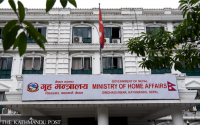National
After Court verdict on sting operations, questions arise over sub judice cases
Top court is silent on the fate of those already convicted on the basis of sting operations.
Prithvi Man Shrestha
After the Supreme Court’s verdict last Wednesday to bar the Commission for the Investigation of Abuse of Authority from conducting sting operations, questions have been raised from various quarters about the fate of the sub judice court cases and people already convicted of corruption based on previous sting operations.
According to officials at the Supreme Court and the Special Court, over 600 corruption cases that were filed on the basis of sting operations are sub judice in the Special Court and the Supreme Court. Devendra Dhakal, information officer at the Supreme Court, said over 300 such cases are at different stages in the apex court. Likewise, Special Court Spokesperson Pushpa Raj Pandeya said 313 such cases are pending at the court while 57 have been settled so far during this fiscal year. The commission said it has so far conducted 61 sting operations and filed 56 cases in the current fiscal year.
It is still unclear what will happen to these cases as the Supreme Court had issued a brief verdict on April 21 and its full text is still awaited.
Besides nullifying Clause 30 of the Regulations of the Commission for the Investigation of Abuse of Authority Act-1991 that allowed it to conduct sting operations by providing its own cash to arrest corruption-suspect public officials red-handed, the court also said evidences collected based on the same clause for cases that are currently under investigation or are sub judice will not be valid.
This verdict has, however, not clearly stated whether the corruption cases currently under consideration at the Special Court and the Supreme Court would be scrapped automatically. Officials at both the courts said things would be clear only after the Supreme Court publishes the full text of the April 21 verdict.
“I cannot say anything immediately about the implications of the April 21 verdict,” said Bhadrakali Pokharel, spokesperson at the Supreme Court. “Everything will be clear once the full text of the verdict is released.”
According to judicial and legal experts, most of the cases are likely to be scrapped as the commission had used its own cash to arrest the defendants red-handed.
“Most pending cases are likely to be scrapped,” said Former Special Court Chairperson Gauri Bahadur Karki.
“And the verdict has opened the door for them to return to their previous government jobs and receive salaries, pensions and other benefits.”
Legal experts however said the corruption cases based on sting operations in which the commission had not used its money and staff to pay bribes, will not be affected by the April 21 verdict.
Karki, however, said the court’s silence about whether the evidences other than the ones collected through sting operations against a suspect would also be valid in courts, could cause confusion and may lead to the scrapping of strong cases.
“There can be telephone call details and other evidences that may corroborate the evidences collected through sting operations. In my view, the court should have clearly stated that such materials would be recognized as evidence to subject public officials concerned to corruption trials,” he said.
Senior Advocate Balkrishna Neupane also said that after the Supreme Court scrapped the provision related to sting operations involving the commission’s cash, the court may not recognize the secondary evidences as primary evidences collected from sting operations would not be recognized.
But advocate Om Prakash Aryal however thinks that the Supreme Court verdict has not fully negated the evidences collected from sources other than sting operations.
With regard to the sub judice corruption cases, Aryal ruled out the possibility of automatic scrapping. “I think judges will decide on a case by case basis,” he said. “The judges however can put all such cases in a single basket and fix a single hearing date for all such cases before making a judgement on case by case basis.”
After the latest court verdict, the government however does not have the authority to withdraw such corruption cases.
Section 59 (F) of the Corruption Prevention Act-2002 states that “no cases filed under this Act shall be withdrawn or compromised.” After the latest court verdict, most of those who are facing trial based on sting operations are likely to return to their previous jobs sooner or later, according to legal experts.
But, the court has not spoken about the fate of those who have already been convicted of corruption on the basis of sting operations. The verdict has not stated whether it is retroactive.
Former chief of the commission, Surya Nath Upadhyay said: “The commission’s regulations were valid until the latest court verdict so the earlier convictions based on evidences collected through sting operations will not be overturned,” he told the Post last Wednesday.
Officials at both the Supreme Court, Special Court and the commission could not immediately confirm how many public officials have so far been convicted on the basis of evidences collected through sting operations.
“But after this new verdict, those who feel they were unjustly convicted can move the Supreme Court,” said Karki.




 20.81°C Kathmandu
20.81°C Kathmandu














